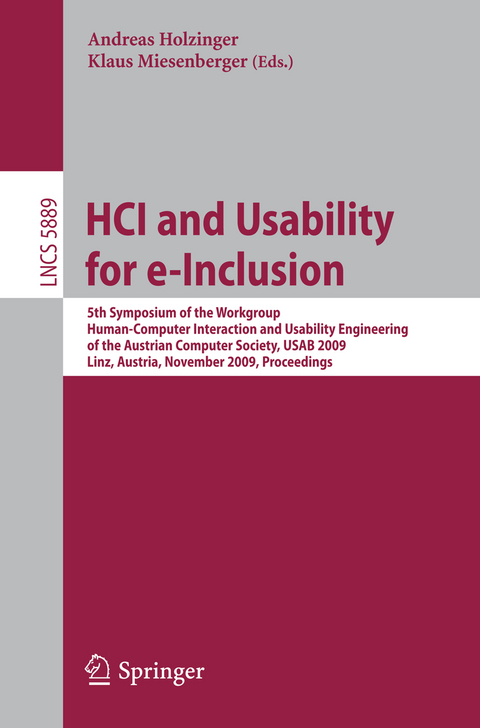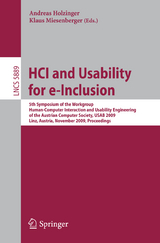HCI and Usability for e-Inclusion
Springer Berlin (Verlag)
978-3-642-10307-0 (ISBN)
Ing. Mag. rer. nat. Mag. phil. Dr. phil. Andreas Holzinger, geb. 1963 in Graz, Radio- und Fernsehtechniker, Industrietätigkeit in der Informationstechnik, Werkmeister für Industrielle Elektronik und Lehrlingsausbilderprüfung. College of Further Education Bournemouth (England) mit Schwerpunkt Computertechnik. Studien der Nachrichtentechnik, Physik und Psychologie sowie Medienpädagogik und Soziologie an der TU und Uni Graz. Promotion mit 'summa cum laude' auf dem Gebiet der Kognitionswissenschaft. Hochschullehrer am Institut für Informationsverarbeitung und computergestützte neue Medien der TU-Graz. Vorstandsassistent am Institut für medizinische Informatik, Statistik und Dokumentation. Konsulent des österreichischen Wissenschaftsministeriums. Österreichischer Experte in der Europäischen Union im Bereich Multimedia (eEurope). Dr. Holzinger forscht, arbeitet und lehrt in den Gebieten: Informationssysteme, Multimedia, Human-Computer-Interaction, Internet/Intranet, Intelligente Tutorielle Systeme.
Keynote: New Trends in Human-Computer Interaction.- The Changing Face of Human-Computer Interaction in the Age of Ubiquitous Computing.- Age, Attitudes, Abilities, Acceptance, Attention: Gender and Cognitive Performance.- Different Perspectives on Technology Acceptance: The Role of Technology Type and Age.- A Mixed-Method Approach on Digital Educational Games for K12: Gender, Attitudes and Performance.- Improving Cognitive Abilities and e-Inclusion in Children with Cerebral Palsy.- Finding Relevant Items: Attentional Guidance Improves Visual Selection Processes.- Usefulness, Usability, Accessibility, Emotion: Confidence and the Elderly.- Which Factors Form Older Adults' Acceptance of Mobile Information and Communication Technologies?.- A Usability and Accessibility Design and Evaluation Framework for ICT Services.- The Building Bridges Project: Involving Older Adults in the Design of a Communication Technology to Support Peer-to-Peer Social Engagement.- Cultural Specific Effects on the Recognition of Basic Emotions: A Study on Italian Subjects.- Usability Testing, Evaluation, Measurement: Education, Learning and e-Inclusion.- Digital Literacy - Is It Necessary for eInclusion?.- Enhancing Wikipedia Editing with WAI-ARIA.- Seeing the System through the End Users' Eyes: Shadow Expert Technique for Evaluating the Consistency of a Learning Management System.- Accessibility of Educational Software: A Problem Still to Be Solved.- Special Session: Design for Adaptive Content Processing.- Accessibility-by-Design: A Framework for Delivery-Context-Aware Personalised Media Content Re-purposing.- Generating Dialogues from the Description of Structured Data.- Book4All: A Tool to Make an e-Book More Accessible to Students with Vision/Visual-Impairments.- EnhancingAccessibility of Web Content for the Print-Impaired and Blind People.- Heuristics and Theory Based Research: Grounded Theory, Activity Theory and Situated Action.- Towards the Era of Mixed Reality: Accessibility Meets Three Waves of HCI.- Investigating Agile User-Centered Design in Practice: A Grounded Theory Perspective.- A Bridge to Web Accessibility from the Usability Heuristics.- E-Inclusion in Public Transport: The Role of Self-efficacy.- Special Session: Smart Home, Health and Ambient Assisted Living.- Smart Home Technologies: Insights into Generation-Specific Acceptance Motives.- User Interaction Design for a Home-Based Telecare System.- A Videophone Prototype System Evaluated by Elderly Users in the Living Lab Schwechat.- Avatars@Home.- Effects of Aging and Domain Knowledge on Usability in Small Screen Devices for Diabetes Patients.- User Centred Design and Usability Practice: Showcases and Surveys.- A Standalone Vision Impairments Simulator for Java Swing Applications.- AltText: A Showcase of User Centred Design in the Netherlands.- Usability Practice in Medical Imaging Application Development.- Current State of Agile User-Centered Design: A Survey.- Applications and Analyses: Interaction, Assistive Technologies and Virtual Environments.- Predicting Pointing Time from Hand Strength.- Analyzing Interaction Techniques Using Mouse and Keyboard for Preschool Children.- The Use of ICT to Support Students with Dyslexia.- Investigating of Memory - Colours of Intellectually Disabled Children and Virtual Game Addict Students.- Analyses and Investigations: Communication, Interfaces and Haptic Technology.- A Sign Language Screen Reader for Deaf.- Spoken Dialogue Interfaces: Integrating Usability.- Usability and Accessibility of eBay by Screen Reader.- Video RelayService for Signing Deaf - Lessons Learnt from a Pilot Study.- Using a Log Analyser to Assist Research into Haptic Technology.- Closing: New Technologies and Challenges for People with Disabilities.- Usability in Public Services and Border Control.
| Erscheint lt. Verlag | 26.10.2009 |
|---|---|
| Reihe/Serie | Lecture Notes in Computer Science | Programming and Software Engineering |
| Zusatzinfo | XVII, 554 p. |
| Verlagsort | Berlin |
| Sprache | englisch |
| Maße | 155 x 235 mm |
| Gewicht | 872 g |
| Themenwelt | Mathematik / Informatik ► Informatik ► Betriebssysteme / Server |
| Informatik ► Software Entwicklung ► User Interfaces (HCI) | |
| Schlagworte | Accessibility • Assistive Technology • augmented reality • biometrics • cognitive processes • Computer Mediated Communication • Conceptual Design • Decision Making • digital educational games • E-Book • E-Commerce • Educational Software • elderly people • E-Learning • formal methods • Haptic • Hardcover, Softcover / Informatik, EDV/Betriebssysteme, Benutzeroberflächen • HCI • Health Care • Human Computer Interaction • Human-Computer Interaction (HCI) • Human Factors • impaired users • Medical Informatics • Mobile Learning • Performance Measurement • Pervasive Computing • Recommender Systems • Reusability • security • Simulation • Smart Home • Social Software • Stent • ubiquitous computing • Usability • User Centered Design • Virtual Environments • Virtual Reality • VoIP • Web 2.0 • Web Accessibility • Wiki • Wikipedia |
| ISBN-10 | 3-642-10307-3 / 3642103073 |
| ISBN-13 | 978-3-642-10307-0 / 9783642103070 |
| Zustand | Neuware |
| Haben Sie eine Frage zum Produkt? |
aus dem Bereich




